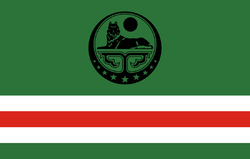Dzhokhar Dudayev Battalion
Dzhokhar Dudayev Battalion (Ukrainian: Батальйон Джохара Дудаєва) is a Chechen volunteer battalion named after the first President of the Chechen Republic of Ichkeria, Dzhokhar Dudayev. The battalion is made up mostly of Chechen volunteers, many of whom fought in the First Chechen War and Second Chechen War on the side of the Republic of Ichkeria. The battalion has been under the command of the British-educated Chechen national Adam Osmayev since 1 February 2015, after Munayev was killed in action at the Battle of Debaltseve in Eastern Ukraine.[3][4]
| Dzhokhar Dudayev Battalion | |
|---|---|
| Participant in the Russian military intervention in Ukraine | |
 The flag of the Chechen Republic of Ichkeria is used by the battalion[1] | |
| Active | 2014—present |
| Leaders | Isa Munayev † Amina Okuyeva † Adam Osmayev |
| Area of operations | Kherson Oblast Dnipropetrovsk Oblast |
| Size | Several hundred[2] |
| Allies | |
| Opponent(s) | |
| Battles and war(s) | War in Donbass |
Overview
History
The creation of the battalion began in early March 2014 in Denmark. This is where a large number of chechens, opposition to Russia and forced to emigrate after the Second Russian-Chechen War, are located. It was initiated by the Free Caucasus Organization, which was created in 2006 in Denmark by political emigrants from Caucasus countries in Europe.[5] The battalion's founder and first leader Isa Munayev was appointed a military commander in charge of the defense of the Chechen capital by Ichkeria's President Aslan Maskhadov during the Battle of Grozny (1999–2000) where he used various urban warfare tactics including ambushes, car bombs, and mines during the defense of the city.[6][7] Colonel Isa Sadigov became the chief of staff of the battalion. Some fighters in the battalion were recruited due to their interest in fighting in Syria but were convinced to go to Ukraine instead.[8]
Battalion composition
Desire to participate in the fight against Russian aggression in Ukraine was immediately revealed by more than 300 volunteers. The battalion includes Chechens, Georgians, Ingush, Azerbaijanis, Ukrainians and volunteers from European countries.
Participation in warfare
Chechen specialists take part in battles in the East of Ukraine and work as instructors, training young commanders[3].
References
- "Picture". media.worldbulletin.net. Archived from the original on 29 June 2015.
- Walker, Shaun (24 July 2015). "'We like partisan warfare.' Chechens fighting in Ukraine - on both sides". the Guardian.
- Mamon, Marcin (27 February 2015). "The Final Days of a Chechen Commander Fighting in Ukraine". The Intercept. Retrieved 27 January 2020.
- Walker, Shaun (24 July 2015). "'We like partisan warfare.' Chechens fighting in Ukraine - on both sides". The Guardian. ISSN 0261-3077. Retrieved 27 January 2020.
- Fedor, Julie; Greene, Samuel; Härtel, Andre; Makarychev, Andrey; Umland, Andreas (11 October 2016). Journal of Soviet and Post-Soviet Politics and Society: 2016/2: Violence in the Post-Soviet Space. Columbia University Press. ISBN 978-3-8382-6948-1.
- Walker, Shaun (24 July 2015). "'We like partisan warfare.' Chechens fighting in Ukraine - on both sides". The Guardian. ISSN 0261-3077. Retrieved 27 January 2020.
- Vatchagaev, Mairbek (18 July 2014). "Chechen Experience in Urban Combat Could Be of Vital Use to Ukraine". North Caucasus Weekly. Jamestown Foundation. 15 (14). Retrieved 10 April 2020.
- Dearden, Lizzie (10 October 2014). "Chechen Isis fighters under Omar al-Shishani threaten to take fight to Putin". The Independent. Retrieved 10 April 2020.